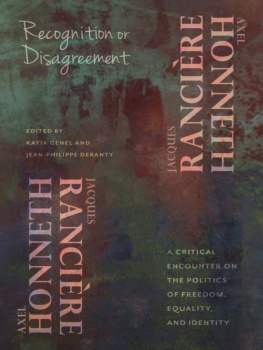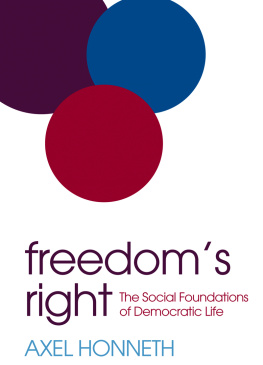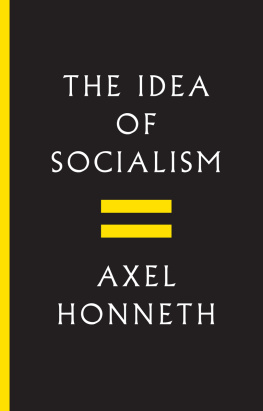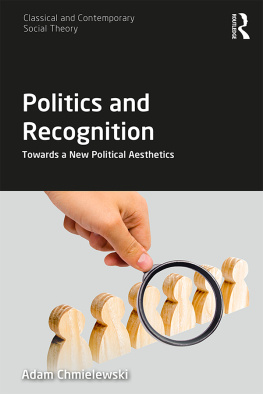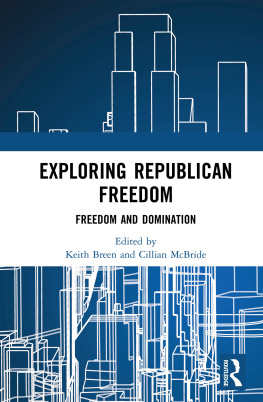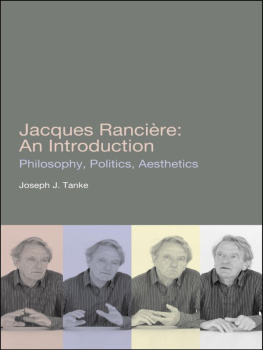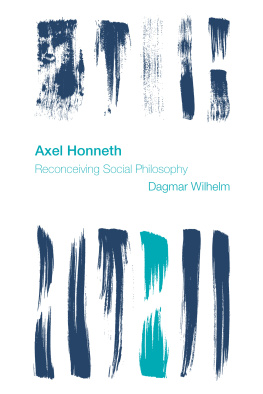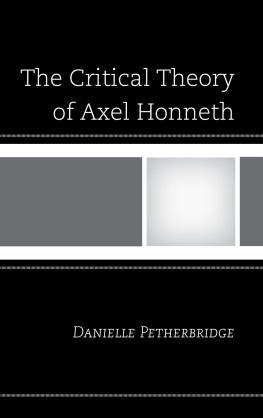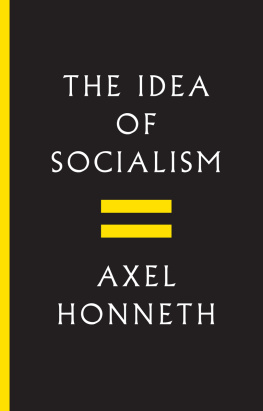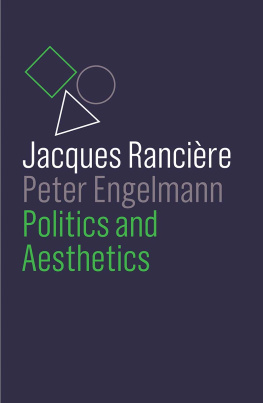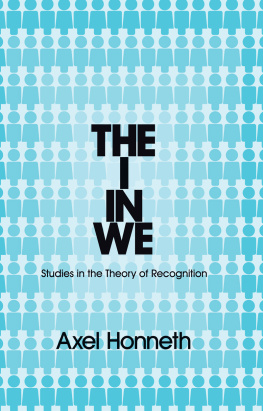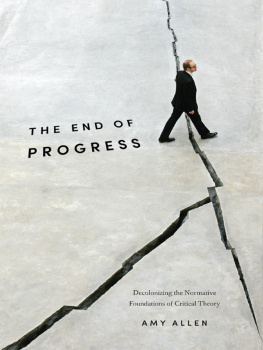Table of Contents
Recognition or Disagreement
NEW DIRECTIONS IN CRITICAL THEORY
NEW DIRECTIONS IN CRITICAL THEORY
Amy Allen, General Editor
New Directions in Critical Theory presents outstanding classic and contemporary texts in the tradition of critical social theory, broadly construed. The series aims to renew and advance the program of critical social theory, with a particular focus on theorizing contemporary struggles around gender, race, sexuality, class, and globalization and their complex interconnections.
Narrating Evil: A Postmetaphysical Theory of Reflective Judgment, Mara Pa Lara
The Politics of Our Selves: Power, Autonomy, and Gender in Contemporary Critical Theory, Amy Allen
Democracy and the Political Unconscious, Nolle McAfee
The Force of the Example: Explorations in the Paradigm of Judgment, Alessandro Ferrara
Horrorism: Naming Contemporary Violence, Adriana Cavarero
Scales of Justice: Reimagining Political Space in a Globalizing World, Nancy Fraser
Pathologies of Reason: On the Legacy of Critical Theory, Axel Honneth
States Without Nations: Citizenship for Mortals, Jacqueline Stevens
The Racial Discourses of Life Philosophy: Ngritude, Vitalism, and Modernity, Donna V. Jones
Democracy in What State?, Giorgio Agamben, Alain Badiou, Daniel Bensad, Wendy Brown, Jean-Luc Nancy, Jacques Rancire, Kristin Ross, Slavoj iek
Politics of Culture and the Spirit of Critique: Dialogues, edited by Gabriel Rockhill and Alfredo Gomez-Muller
For a complete list of the series see

Columbia University Press
Publishers Since 1893
New York Chichester, West Sussex
cup.columbia.edu
Copyright 2016 Columbia University Press
All rights reserved
E-ISBN 978-0-231-54144-2
, Of the Poverty of Our Liberty: The Greatness and Limits of Hegels Doctrine of Ethical Life, was originally published in the German as Von der Armut unserer Freiheit: Gre und Grenzen der Hegelschen Sittlichkeitslehre Suhrkamp Verlag Berlin.
Library of Congress Cataloging-in-Publication Data
Names: Honneth, Axel, 1949 author. | Rancire, Jacques, author. | Genel, Katia, editor.
Title: Recognition or disagreement : a critical encounter on the politics of freedom, equality, and identity / Axel Honneth and Jacques Rancire ; edited by Katia Genel and Jean-Philippe Deranty.
Description: New York : Columbia University Press, 2016. | Series: New directions in critical theory | Includes bibliographical references and index.
Identifiers: LCCN 2015039970 | ISBN 9780231177160 (cloth : alk. paper) | ISBN 9780231541442 (e-book)
Sbjects: LCSH: Critical theory. | Political sciencePhiliosophy. | Honneth, Axel, 1949 | Rancire, Jacques. | Recognition (Philosophy)
Classification: LCC B809.3 .H667 2016 | DDC 320.092/2dc23
LC record available at http://lccn.loc.gov/2015039970
A Columbia University Press E-book.
CUP would be pleased to hear about your reading experience with this e-book at .
Cover and book design: Lisa Hamm
Cover image: Hermione Carline, Illumination Dark.
Private Collection/Bridgeman Images
References to websites (URLs) were accurate at the time of writing. Neither the author nor Columbia University Press is responsible for URLs that may have expired or changed since the manuscript was prepared.
CONTENTS
| KATIA GENEL |
| JEAN-PHILIPPE DERANTY |
| JACQUES RANCIRE |
| AXEL HONNETH |
| JACQUES RANCIRE |
| AXEL HONNETH |
KATIA GENEL
A BRIEF ENCOUNTER
To this effect, a meeting was organized in June 2009 in Frankfurt am Main, in the historical building of the Institute for Social Research. Axel Honneth and Jacques Rancire initiated a discussionmoderated by the German Philosopher Christoph Menkearound the key theses of their best-known books, The Struggle for Recognition and Disagreement. Each thinker began by reconstructing the theoretical position of his interlocutor. This issued in a debate on the underlying principles of the critical theory that each represents, a clarification of their methodological approaches to society and politics, and, finally, a discussion of the possibility of overcoming injustice and of a political transformation of society. Indeed, their discussion centered on the very meaning of critical theory. It is a specific task of this volume to help elucidate this meaning.
This book is the result of this short and intense encounter between the two thinkers. What is published here are the texts presented by Honneth and Rancire, the theoretical exchange that took place between them, and a supplementary text from each author intended to provide a deeper understanding of their thinking, their theoretical orientations, and their methods. Honneths method has a strong Hegelian spirit. It is marked by a specific way of discussing political issuesand here, more specifically, the political concept of freedomthrough an approach he refers to as social philosophy, that is to say, a philosophical type of analysis that takes society as an object and relies on the results of the social sciences. Rancires method is a radical political questioning based on the principle whereby the social order is contested by any act that presupposes the equality of anyone with anyone and that verifies it (a method of equality). I believe that the short yet substantive discussions between the two thinkers represent a model and an excellent starting point for comparative studies into the possible ways of exercising social criticism, and that such comparative work is particularly apt to develop fruitful perspective onto many significant theoretical issues. Each of these practices shows important deficits in the other approach. One focuses on the need to transform society by the advent of social orders of recognition, the other on the affirmation of politics, assuming the irreversible division of the social. Thinking this divergence enlightens the reference to a critical approach in a large sense. This introduction discusses the texts published in this volume, and frames the confrontation between the two authors in relation to the main coordinates of their thinking. Jean-Philippe Derantys discussion, by contrast, takes a broader focus and seeks to situate the two models in the overall theoretical landscape, highlighting problems and potentials that each of the two models raises in relation to the general project of a philosophical critique of contemporary society. A substantive bibliography with a specific focus on the confrontation between the German and the French traditions is provided at the end of the volume to assist students and researchers in comparative studies in critical theory.
TWO CRITICAL THEORISTS?
While Honneth refers to the concept of freedom and Rancire uses equality as his central concept, both authors share the same fundamental concerns: they both question contemporary societies by asking about the conditions of justice. They both develop tools that are intended to help us understand the social mechanism that prevents the realization of justice and develop a theory to overcome injustice. Indeed, if we consider the appellation critical theory in a very broad sense, both authors can be linked to this tradition. But what is a point of connection between them is also a problem or a set of problems.

